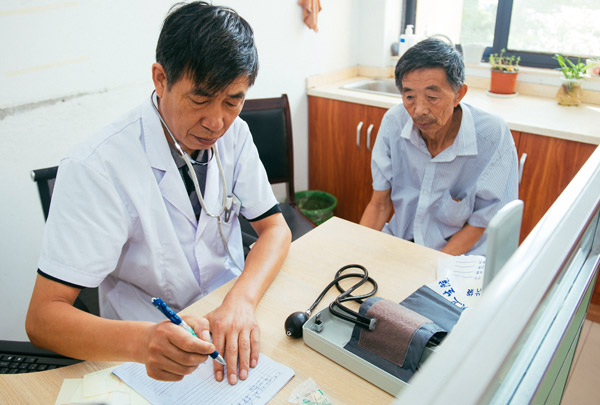It was just a handshake, but what a lasting impression it had
By Cang Wei in Nanjing | China Daily | Updated: 2017-10-12 07:47
 |
| A doctor treats a patient at Shiye Health Center in Zhenjiang, Jiangsu province, last year. [Photo by Liu Jinhai/Xinhua] |
One Friday morning in September, 73-year-old Wei Dingyu went to the health center of Shiye, in Zhenjiang, Jiangsu province, to check his blood pressure and blood sugar. It cost him 1 yuan ($0.15) to register and have the two tests.
Wei lives with his grandson, since his wife and two sons passed away. He has varicose veins and diabetes.
But Wei said he does not worry about living costs, especially medical expenses, due to the medical services provided by the health center.
"Because of my low income, all my medical expenses at the outpatient clinic are exempt. The medical insurance also covers 95 percent of hospitalization expenses."
In late 2014, Wei had surgery on his varicose veins. He paid 600 yuan for the surgery, though it usually cost thousands.
That was when he met President Xi Jinping at the health center.
"I was very nervous at first because I never had the chance to meet such a high-ranking official," Wei said. "I reached out a hand when we shook hands, but the president reached out both of his hands to hold my hand inside his hands. He was so amiable and affable."
During his visit to the health center of Shiye, Xi said that the goal of an overall well-off society can be realized only when the health of Chinese people is taken care of.
He reiterated that people living in rural areas should have access to good medical resources, just as those living in cities, and that efficient and cheap public health and basic medical service should be provided to the masses to effectively solve medical problems.
As one of the pilot cities of China's medical reform, Zhenjiang is uniting health centers at communities with excellent downtown hospitals to benefit local people.
Hu Xiaozhong, director of the Shiye Health Center, said that many Chinese people prefer going to good downtown hospitals rather than nearby health centers even if they just have a cold.
"To change the current situation, we have cooperated with downtown hospitals and asked their experts to come to rural areas. By now, they have sent 505 doctors to consult with 7,656 patients."
"Now, the health center is our residents' first choice when they feel uncomfortable," he said. "It also reduces the pressure that downtown hospitals bear."
Hu said the center has developed a remote monitoring system, which allows local doctors to give timely suggestions to their patients.
Shiye, an island in the Yangtze River that covers 44 square kilometers, is home to more than 140,000 people. The island, which is known to few outsiders, has gained increasing attention due to its achievement in healthcare and environmental protection.
The township has established electronic health records for 130,000 of its residents. Doctors at the health center answer their questions online and visit the patients regularly.
Wu Yuzhen, a worker with the center, said that local people have started to exercise and pay more attention to their diet.
"We used to tell them repeatedly that they need to exercise more and eat healthier," she said. "But our suggestions are not as persuasive as their electronic medical records. It's good to see more people jogging along the river and walk for a while after dinner."
Guo Jun contributed to this story.
























